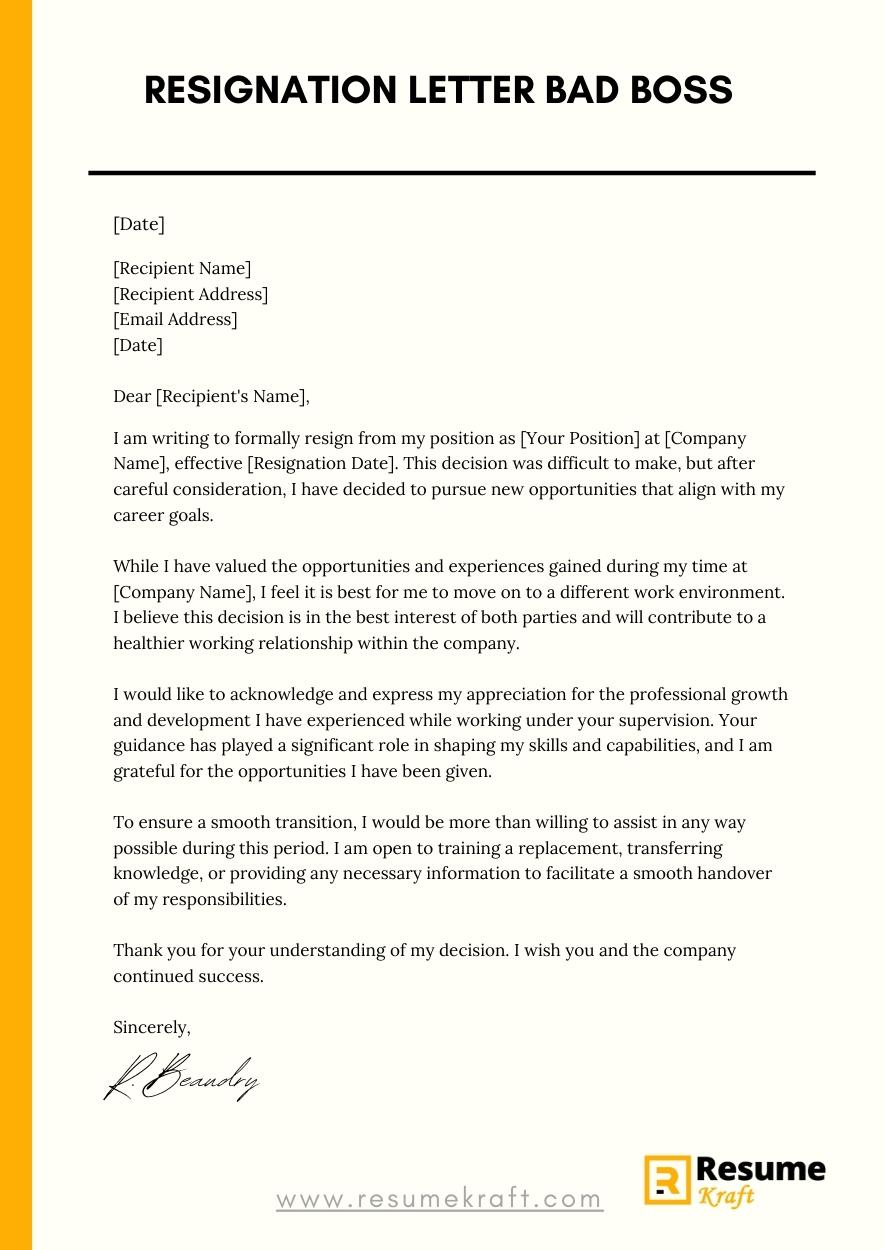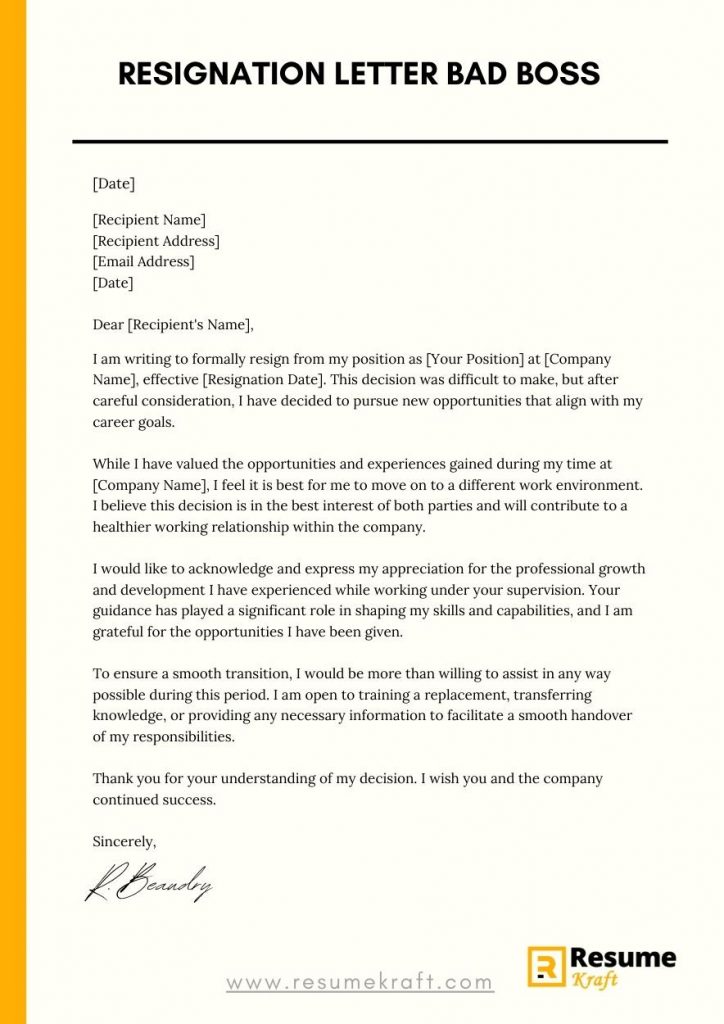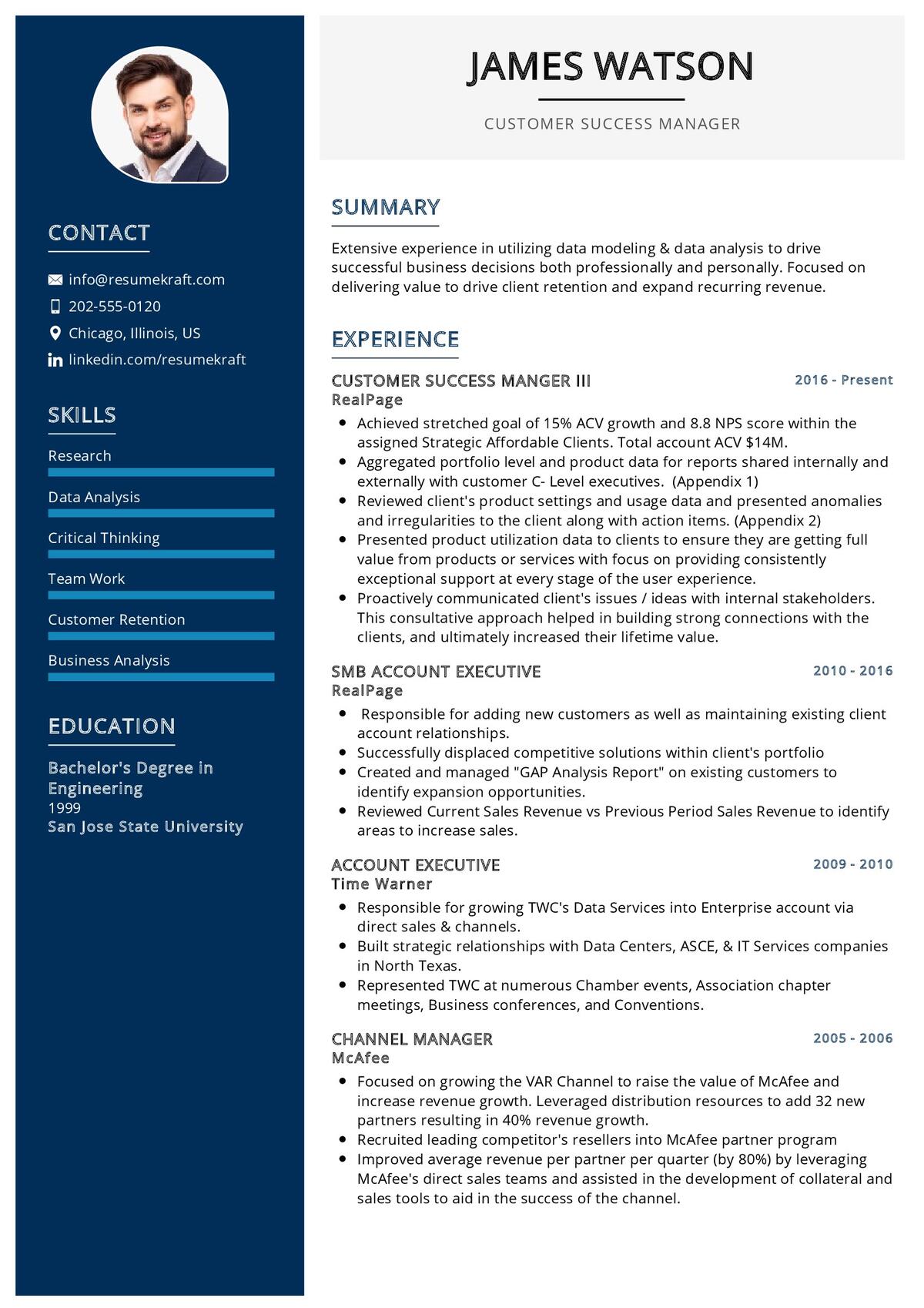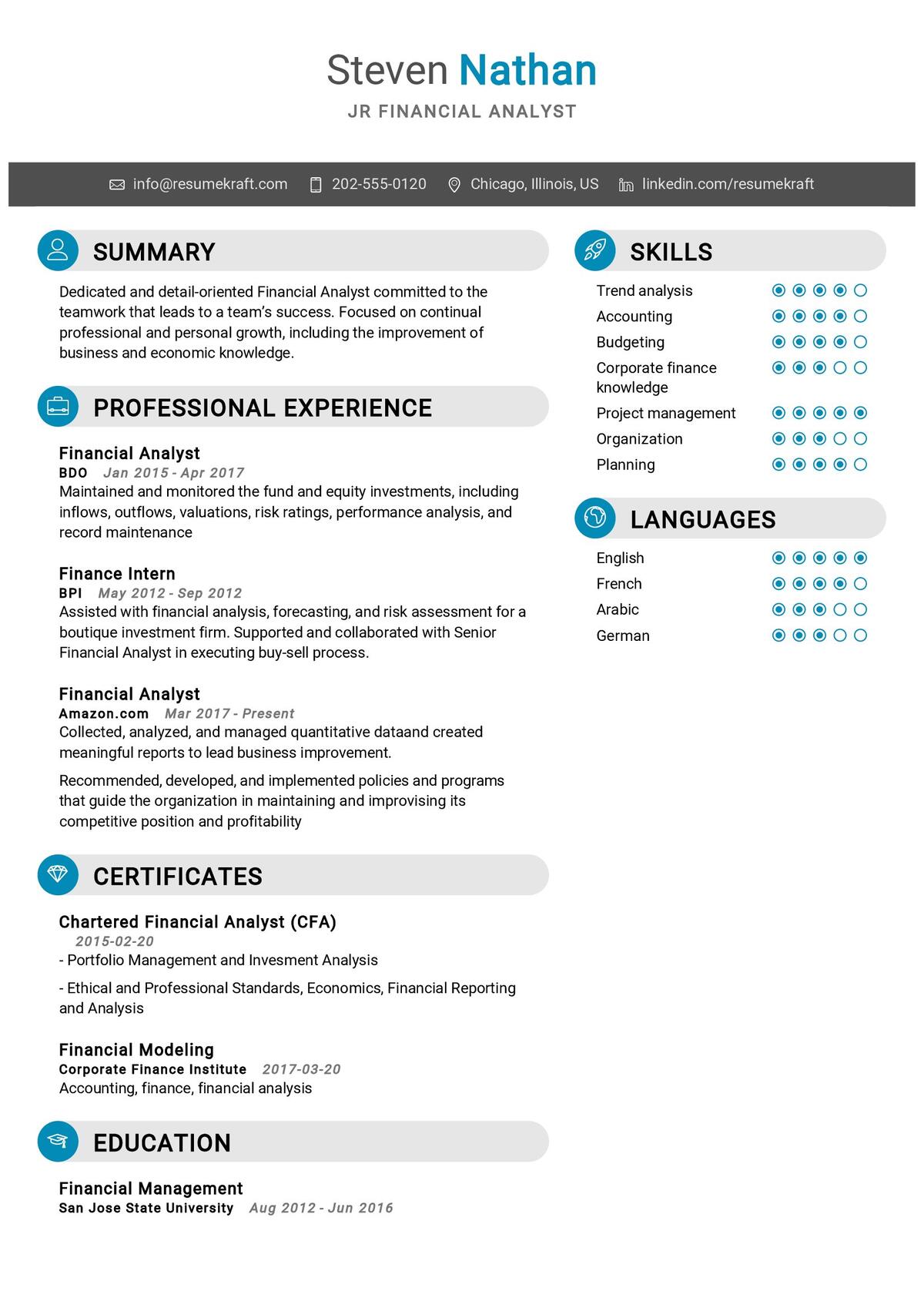
Resigning from a job can be a difficult and emotional decision, especially when dealing with a bad boss. However, a well-written resignation letter can help ensure a smooth transition and ensure your departure is handled professionally. In this article, we will discuss how to write an effective resignation letter specifically addressing a bad boss, and provide sample letters for your reference.
Working under a bad boss can be challenging and unbearable at times. It is essential to maintain professionalism throughout the resignation process to protect your reputation and avoid burning any bridges. A resignation letter is your opportunity to express your intentions to leave and provide reasons for your decision. Let’s dive into the key components to include in a resignation letter to a bad boss.
What To Include in a Resignation Letter to a Bad Boss
- Your Contact Information: Begin your letter by including your full name, address, phone number, and email address.
- Date: Add the date of writing the letter.
- Recipient’s Information: Include your boss’s name, job title, company name, and address.
- Salutation: Start with a professional salutation, such as “Dear [Boss’s Name],”.
- Resignation Statement: Clearly state that you are resigning from your position and provide the effective date of your departure.
- Reasons for Resigning: Briefly mention the reasons for your resignation, while remaining professional and tactful. Avoid personally attacking your boss.
- Appreciation: Express gratitude towards your boss for the opportunities and experiences gained while working at the company.
- Smooth Transition: Offer your support during the transition period, such as training a replacement or providing any necessary information.
- Closing: End the letter with a professional closing, such as “Sincerely,” followed by your name.
- Signature: Leave space for your handwritten signature if printing the letter, or simply type your full name if emailing the letter.
What Not to Include in Your Resignation Letter to a Bad Boss
While it’s important to address your dissatisfaction with your boss, it’s crucial to maintain professionalism and avoid any negative, hostile, or confrontational language in your resignation letter. Here are a few things you should avoid including:
- Personal Attacks: Refrain from personally attacking or criticizing your boss in the letter. Instead, focus on the reasons for your departure and maintain a respectful tone.
- Negative Remarks: Avoid making negative comments about the company, your coworkers, or any specific incidents. Keep the letter focused on your decision to resign.
- Detailed Complaints: It’s not the time to go into detail about every negative experience you’ve had with your boss. Stick to concise and objective statements.
- Emotional Language: While it’s understandable to have strong emotions, avoid using overly emotional language in your resignation letter. Keep it professional and polite.
How To Format a Resignation Letter to a Bad Boss
The format of your resignation letter should be formal and professional. Here’s a suggested format to follow:
- Your Contact Information
- Date
- Recipient’s Information
- Salutation
- Resignation Statement
- Reasons for Resigning
- Appreciation
- Smooth Transition
- Closing
- Signature
Make sure to use a clear and concise writing style, with proper grammar and spelling. Be aware of the tone you use throughout the letter, aiming for professionalism rather than confrontation.
Resignation Letter Sample to a Bad Boss

Printed Resignation Letter Sample
[Your Name]
[Your Address]
[City, State, ZIP]
[Phone Number]
[Email Address]
[Date]
[Bad Boss’s Name]
[Bad Boss’s Job Title]
[Company Name]
[Company Address]
Dear [Bad Boss’s Name],
I am writing to formally resign from my position as [Your Position] at [Company Name], effective [Resignation Date]. This decision was difficult to make, but after careful consideration, I have decided to pursue new opportunities that align with my career goals.
While I have valued the opportunities and experiences gained during my time at [Company Name], I feel it is best for me to move on to a different work environment. I believe this decision is in the best interest of both parties and will contribute to a healthier working relationship within the company.
I would like to acknowledge and express my appreciation for the professional growth and development I have experienced while working under your supervision. Your guidance has played a significant role in shaping my skills and capabilities, and I am grateful for the opportunities I have been given.
To ensure a smooth transition, I would be more than willing to assist in any way possible during this period. I am open to training a replacement, transferring knowledge, or providing any necessary information to facilitate a smooth handover of my responsibilities.
Thank you for your understanding of my decision. I wish you and the company continued success.
Sincerely,
[Your Full Name]
Email Resignation Letter Example
Subject line: Resignation – [Your Name]
Dear [Bad Boss’s Name],
I hope this email finds you well. After thoughtful consideration, I am writing to inform you of my decision to resign from my position as [Your Position] at [Company Name], effective [Resignation Date]. The purpose of this email is to provide formal notice regarding my departure from the company.
I genuinely appreciate the opportunities and experiences I have gained while working here, particularly under your guidance. Your leadership has helped me grow both professionally and personally, and I am grateful for the support you have shown me.
However, after careful evaluation of my career goals and in light of recent experiences, I have decided it is in my best interest to seek a new work environment. I believe this decision will lead to a more positive and fulfilling career path.
I am committed to ensuring a smooth transition during this period. Please let me know how I can be of assistance in transferring my responsibilities or any other tasks that may facilitate a smooth handover to my successor.
Thank you for your understanding and support. I wish you and the company continued success in the future.
Sincerely,
[Your Full Name]
Key Takeaways
Writing a resignation letter to a bad boss may require extra care and tact to maintain professionalism. Here are the key takeaways to remember:
- Remain professional and courteous throughout the letter.
- Focus on your reasons for leaving rather than attacking your boss.
- Offer assistance during the transition period for a smooth handover.
- Use a professional format and check for grammar and spelling errors.
Remember, resigning from a job is a personal decision, and providing a well-written resignation letter is crucial to leaving on good terms and maintaining a positive professional reputation.
Planning to Write a Resume?
Check our job winning resume samples


Frequently Asked Questions
1. Is it necessary to mention the reason for resigning in a resignation letter to a bad boss?
It is not necessary to mention the specific reasons for resigning in a resignation letter to a bad boss. However, if you choose to do so, it is important to remain professional and tactful in your wording, focusing on your career goals rather than criticizing your boss.
2. Should I include my contact information in a resignation letter?
Yes, it is important to include your contact information in a resignation letter so that your employer can reach out to you if necessary, even after you have left the company.
3. Can I email my resignation letter instead of printing and delivering it personally?
Yes, it is acceptable to email your resignation letter if it is more convenient for you. However, make sure to follow proper email etiquette and send it to the appropriate recipients.
4. How much notice should I provide in my resignation letter?
Typically, providing a two-week notice is considered standard practice. However, the specific notice period may vary depending on your employment contract or company policy. It is best to check with your HR department or refer to your employment agreement for guidance on the notice period.
5. Should I mention any negative experiences with my boss in the resignation letter?
It is generally not recommended to mention specific negative experiences or complaints about your boss in your resignation letter. Instead, focus on the reasons for your decision to leave and maintain a professional tone throughout the letter.
Conclusion
Writing a resignation letter to a bad boss can be a sensitive task, but it is essential to maintain professionalism and leave on good terms. By following the guidelines and using the sample letters provided in this article, you can ensure a smoother transition and protect your professional reputation. Remember, it is always important to approach challenging situations with grace and positivity.

